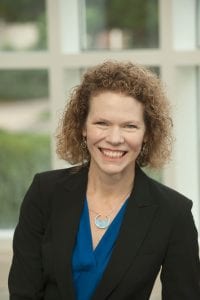Professor Peter Weyand, director of the Locomotor Performance Laboratory in Simmons, is featured in a Wired video and article, What’s the Fastest 100 Meter Dash a Human Can Run? The premise that reporter Robbie Gonzalez examines is if it is humanly possible to run the 100 meter dash in nine seconds flat. Usain Bolt, the fastest human, runs the 100 meter dash in 9.58 seconds. A visit with Weyand in the lab determines the answer.  Click here for the video and article.
Click here for the video and article.
Month: December 2018
Gándara receives AERA Grant to Examine Promise Programs
 Assistant Professor Denisa Gándara, Department of Education Policy and Leadership, has received one of three American Educational Research Association (AERA) research grants to study free college or “Promise” programs with co-PI Amy Li (University of Northern Colorado).
Assistant Professor Denisa Gándara, Department of Education Policy and Leadership, has received one of three American Educational Research Association (AERA) research grants to study free college or “Promise” programs with co-PI Amy Li (University of Northern Colorado).
Promise programs, which cover college tuition (and sometimes other costs) for all eligible students in a geographic region, have proliferated across the United States, with recent adoptions in New York, California, and Dallas County.
Gándara and Li’s study is the first to examine, at a national scale, which groups of students benefit most from these programs. Specifically, the study examines how enrollments change at community colleges that are subject to Promise programs, and how effects vary by Promise program design features. The study ends October 2019.
Ketterlin Geller Joins NSF-Funded Committee to Broaden Participation in STEM
 Professor Leanne Ketterlin Geller, Texas Instruments Endowed Chair in Education and director of Research in Mathematics Education, has been tapped to participate in CADRE, a National Science Foudation funded steering committee to broaden participation in preK- 12 STEM education.
Professor Leanne Ketterlin Geller, Texas Instruments Endowed Chair in Education and director of Research in Mathematics Education, has been tapped to participate in CADRE, a National Science Foudation funded steering committee to broaden participation in preK- 12 STEM education.
Part of her contribution includes co-writing briefs based on NSF supported research that underscores steps educators can take to improve STEM.
She is featured in a video about this work, produced by CADRE K-12.
Kamata Heads IES Research Partnership to Improve Pre-K Quality
 Akihito Kamata, executive director of the Center on Research and Evaluation (CORE) in Simmons, is leading a research partnership between his team and the Dallas Independent School District (Dallas ISD) to improve the quality of pre-K classrooms.
Akihito Kamata, executive director of the Center on Research and Evaluation (CORE) in Simmons, is leading a research partnership between his team and the Dallas Independent School District (Dallas ISD) to improve the quality of pre-K classrooms.
A $400,000 grant from the Institute of Education Sciences will allow researchers to examine pre-K classroom practices in all of the district’s programs.
The purpose of the research partnership is to systematically improve overall pre-K quality through the professional development Dallas ISD provides to instructional coaches and pre-K classroom teachers.
The partnership will focus on differentiating professional development for teachers based on teacher need, focusing on high-quality teacher–child interactions aligned with the CLASS observation instrument and the associated professional development system.
